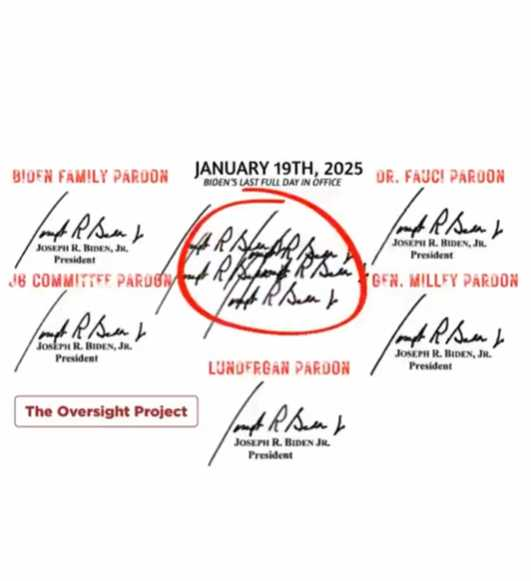WASHINGTON — President Donald Trump ignited a political firestorm early Monday, declaring that pardons issued by his predecessor, Joe Biden, are “void, vacant, and of no further force or effect” because they were allegedly signed using an autopen. In a late-night post on Truth Social, Trump targeted Biden’s clemency for members of the House select committee that investigated the Jan. 6, 2021, Capitol riot, claiming the automated signatures invalidated the acts.
“The ‘Pardons’ that Sleepy Joe Biden gave to the Unselect Committee of Political Thugs, and many others, are hereby declared VOID … because of the fact that they were done by Autopen,” Trump wrote shortly after midnight. He further alleged, without evidence, that Biden “did not know anything about them,” suggesting aides acted unilaterally. The post, reported by NBC News, also featured a meme replacing Biden’s official portrait with an autopen image, amplifying Trump’s mockery.
The claim hinges on the autopen, a mechanical device that replicates a person’s signature, a tool with a decadeslong history in the White House. Its use dates back to at least the 1950s, when President Dwight Eisenhower reportedly employed it for routine correspondence, according to a 2011 report on its legal precedent. The device gained prominence in 2005 when the Department of Justice affirmed its legality for signing legislation, ruling that President George W. Bush’s use of an autopen to sign a bill while abroad was constitutionally sound. Barack Obama became the first president to use it for legislation in 2011, signing a Patriot Act extension from France.
Support my Independent Journalism by becoming a paid subscriber for $6 a month. I can’t do this work without you. You can stop at anytime. Help me to Keep it Real.
Trump’s assertion that autopen use nullifies pardons lacks legal grounding, experts say. The Constitution grants presidents broad pardon power under Article II, Section 2, and no court has ruled that an autopen signature invalidates such acts, per a Business Standard analysis published Monday. Biden’s administration did use the device, including for a 2022 Federal Aviation Administration funding bill, but went to lengths to ensure in-person signatures for major legislation, flying documents to South Korea and St. Croix, according to FOX News 2024 reporting.
Evidence contradicts Trump’s blanket claim. Photographic proof exists of Biden signing many documents, including executive orders, as documented by Newsweek on Monday. Similar scrutiny of Trump’s own executive orders from his first and second terms reveals consistent signatures, suggesting autopen use, per Fox News and Daily Mail analyses. The Heritage Foundation recently alleged widespread autopen use under Biden, but offered no definitive proof that pardons specifically were affected.
Legal scholars doubt Trump’s declaration holds weight. “There’s no precedent for this,” said a constitutional law professor quoted by The Independent. “Autopen signatures are legally binding unless proven to lack presidential intent.” Trump himself acknowledged the issue’s uncertainty Sunday, telling reporters aboard Air Force One that courts would decide, ABC News reported.
The controversy echoes broader attacks on Biden’s presidency. Trump’s post also claimed the Jan. 6 committee members committed “major crimes,” hinting at potential retribution now that their pardons are, in his view, voided. Critics slammed the move as authoritarian, with one Yahoo News commenter calling it “dictator s***.” Supporters, including Vice President JD Vance and Elon Musk, backed Trump’s narrative on social media, per The Express Tribune.
It is not known if a court will step in to make any rulings on this matter.




















